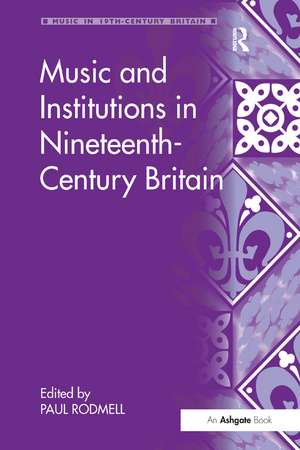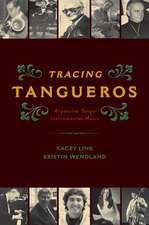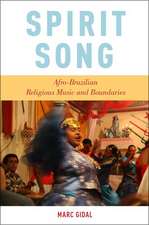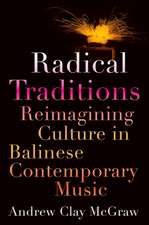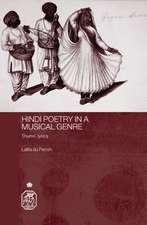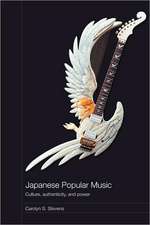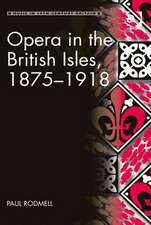Music and Institutions in Nineteenth-Century Britain: Music in Nineteenth-Century Britain
Editat de Paul Rodmellen Limba Engleză Paperback – 17 noi 2016
| Toate formatele și edițiile | Preț | Express |
|---|---|---|
| Paperback (1) | 436.14 lei 43-57 zile | |
| Taylor & Francis – 17 noi 2016 | 436.14 lei 43-57 zile | |
| Hardback (1) | 1114.70 lei 43-57 zile | |
| Taylor & Francis – 28 oct 2012 | 1114.70 lei 43-57 zile |
Din seria Music in Nineteenth-Century Britain
-
 Preț: 178.05 lei
Preț: 178.05 lei - 9%
 Preț: 934.94 lei
Preț: 934.94 lei -
 Preț: 307.59 lei
Preț: 307.59 lei -
 Preț: 469.34 lei
Preț: 469.34 lei -
 Preț: 489.26 lei
Preț: 489.26 lei - 18%
 Preț: 1057.89 lei
Preț: 1057.89 lei - 18%
 Preț: 1002.63 lei
Preț: 1002.63 lei -
 Preț: 469.34 lei
Preț: 469.34 lei -
 Preț: 469.34 lei
Preț: 469.34 lei -
 Preț: 469.34 lei
Preț: 469.34 lei -
 Preț: 469.34 lei
Preț: 469.34 lei - 18%
 Preț: 1005.80 lei
Preț: 1005.80 lei -
 Preț: 469.34 lei
Preț: 469.34 lei - 13%
 Preț: 338.33 lei
Preț: 338.33 lei - 31%
 Preț: 764.62 lei
Preț: 764.62 lei -
 Preț: 469.34 lei
Preț: 469.34 lei - 25%
 Preț: 823.99 lei
Preț: 823.99 lei - 18%
 Preț: 1061.06 lei
Preț: 1061.06 lei -
 Preț: 489.26 lei
Preț: 489.26 lei - 18%
 Preț: 1063.73 lei
Preț: 1063.73 lei - 26%
 Preț: 850.99 lei
Preț: 850.99 lei -
 Preț: 469.34 lei
Preț: 469.34 lei -
 Preț: 469.34 lei
Preț: 469.34 lei - 13%
 Preț: 338.33 lei
Preț: 338.33 lei - 13%
 Preț: 338.33 lei
Preț: 338.33 lei - 18%
 Preț: 1015.26 lei
Preț: 1015.26 lei -
 Preț: 469.34 lei
Preț: 469.34 lei - 18%
 Preț: 1058.38 lei
Preț: 1058.38 lei - 30%
 Preț: 769.55 lei
Preț: 769.55 lei - 18%
 Preț: 1114.70 lei
Preț: 1114.70 lei - 18%
 Preț: 1062.62 lei
Preț: 1062.62 lei - 18%
 Preț: 1061.06 lei
Preț: 1061.06 lei
Preț: 436.14 lei
Nou
Puncte Express: 654
Preț estimativ în valută:
83.45€ • 87.37$ • 69.05£
83.45€ • 87.37$ • 69.05£
Carte tipărită la comandă
Livrare economică 07-21 aprilie
Preluare comenzi: 021 569.72.76
Specificații
ISBN-13: 9781138268234
ISBN-10: 1138268232
Pagini: 308
Dimensiuni: 156 x 234 mm
Greutate: 0.45 kg
Ediția:1
Editura: Taylor & Francis
Colecția Routledge
Seria Music in Nineteenth-Century Britain
Locul publicării:Oxford, United Kingdom
ISBN-10: 1138268232
Pagini: 308
Dimensiuni: 156 x 234 mm
Greutate: 0.45 kg
Ediția:1
Editura: Taylor & Francis
Colecția Routledge
Seria Music in Nineteenth-Century Britain
Locul publicării:Oxford, United Kingdom
Notă biografică
Paul Rodmell is a Senior Lecturer at the University of Birmingham, UK. He is the author of Charles Villiers Stanford (Ashgate, 2002) and has also written on music-making in nineteenth-century Dublin and opera in late-Victorian Britain.
Recenzii
'This collection adds usefully to Ashgate’s Music in Nineteenth-Century Britain series. Rodmell hopes that the book will demonstrate the sheer diversity of the period’s musical structures, the processes through which nineteenth century music became institutionalized and institutions musicalized, and the consequent growth in musicians’ self-confidence as they increasingly escaped from systems of patronage and sought both individual and collective improvement. It largely succeeds in these aims and certainly provides plentiful material for later scholars to build upon. Fertile territory has been thoughtfully marked out. NABMSA Newsletter
Cuprins
Introduction; I: Music Societies and Venues; 1: The Management of Nineteenth-Century Dublin Music Societies in the Public and Private Spheres: The Philharmonic Society and the Dublin Musical Society; 2: Three Madrigal Societies in Early Nineteenth-Century England; 3: ‘A Melodious Phenomenon': The Institutional Influence on Town-Hall Music-Making; 4: A Home for the ‘Phil': Liverpool's First Philharmonic Hall (1849); 5: James Mapleson and the ‘National Opera House'; II: Music Education; 6: Musical Diplomacy and Mary Gladstone's Diary; 7: The Expansion and Development of the Music Degree Syllabus at Trinity College Dublin during the Nineteenth Century; 8: The Music Exams of the Society for the Encouragement of Arts, Manufactures and Commerce, 1859–1919; 9: Resisting the Empire? Public Music Examinations in Melbourne, 1896–1914; III: Music and the State; 10: Birmingham Cathedral, Royle Shore and the Revival of Early English Church Music; 11: On the Beat: The Victorian Policeman as Musician 1; 12: The British Military as a Musical Institution, c. 1780 – c. 1860; 13: Edward Jones, ‘Bard to the King': The Crown, Welsh National Music, and Identity in Late Georgian Britain
Descriere
In nineteenth-century British society music and musicians were organized as they had never been before. This organization was manifested, in part, by the introduction of music into powerful institutions, both out of belief in music's inherently beneficial properties, and also to promote music occupations and professions in society at large. This book provides a representative and varied sample of the interactions between music and organizations in various locations in the nineteenth-century British Empire, exploring not only how and why music was institutionalized, but also how and why institutions became 'musicalized'.
